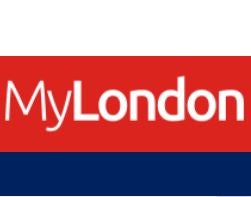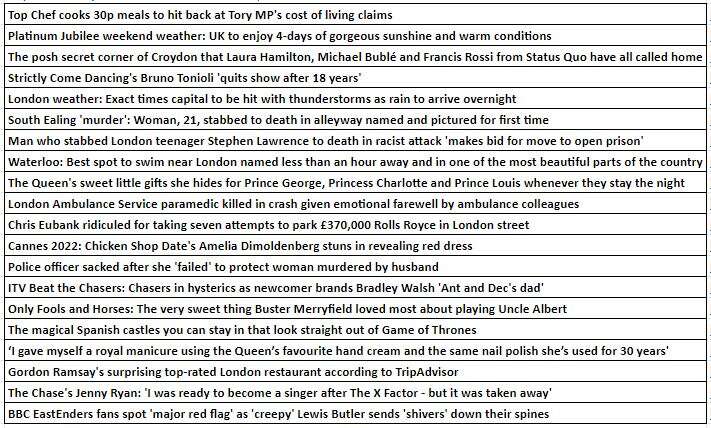
Traffic to Reach’s fast-growing local news site for the UK capital MyLondon has dipped back below that of the Evening Standard amid disquiet among some staff about its traffic growth strategy.
The site overtook the Evening Standard on monthly page views in November 2021, with 31m versus 30m, according to Ipsos Mori – just three years after being launched (though the Standard maintained its lead with unique visitors on 10.8m versus MyLondon’s 6.7m). However, this year traffic to MyLondon has slumped from 37.9m UK page views in January to just over 17m in April, according to Ipsos.
Press Gazette received a tip-off from a former MyLondon journalist about discontent in the newsroom and high staff turnover.
We ultimately spoke to eight former staffers who all complained about pressure to hit individual page view targets and voiced concerns about the type of content they needed to write to hit those targets. Starting pay rates for reporters of £24,000 for a 40-hour, four-day week were another source of complaint.
MyLondon has also struggled to keep staff in the face of a tightening jobs market and competition for journalists in London from national news websites.
As a result, basic pay for reporters has risen in recent weeks from £24,000 to £26,000. Press Gazette understands that senior reporters on MyLondon earn £30,000.
Two former staffers said they had been writing as many as ten articles per day this year in an effort to hit page-view targets.
The former MyLondon journalists Press Gazette spoke to talked of a mismatch between their expectation that they would be producing quality local news and the reality which was often writing a high volume of lighter articles based on trending SEO terms and social media posts.
At a more senior level, the MyLondon editorial team is more settled and Press Gazette understands that the concerns raised are not universally shared.
The site is strong on crime coverage and in December, MyLondon’s investigations into Crossrail delays and Shamima Begum’s school days were nominated for a Press Gazette British Journalism Award.
The site has also highlighted housing issues in London and the plight of asylum seekers.
Reach has issued a robust response to the complaints raised by former staff, saying: “We wholeheartedly reject lazy snobbery about the value we bring to our communities.”
"I was allowed to write about whatever I felt like, which was amazing," said one former reporter. "I remember thinking, okay, the pay is not great, but it seems to be a bit better than other reporter roles out here."
From starting with a newsroom of under ten people, staffing rapidly increased from 2020 onwards to the current total of around 70.
During that time the outlet also added an array of specialist reporting roles, including correspondents to cover race & diversity, health, transport and Whitehall.
MyLondon's expansion came in a period when many Reach outlets were seeing job losses. In July 2020, Reach announced that 550 staff (or around 12% of its then workforce) would lose their jobs to address the impact of the Covid pandemic.
The former MyLondon reporters who spoke to Press Gazette said they would usually write a minimum of five articles a day, but usually seven or eight, with the aim of hitting one million page views per reporter per month (in March leaked internal Reach documents revealed pageview targets of 850,000 per month for reporters on MyLondon).
One former reporter said that of the 12 staff that joined at the same time as them, just over a year later only two remained. One former staffer said they left MyLondon to work in a bar.
Press Gazette understands that ten MyLondon journalists left in the space of a few weeks in March/April.
Looking at 100 of the most recent articles by MyLondon, Press Gazette found around half were about London, while 76 did not involve original reporting.
Some 16 were substantially similar to articles which had already appeared on other sites, 11 were rewrites of articles from other Reach sites, 25 were write-ups of social media posts and 13 came from publicly available information, such as rewriting banned items for flying from an airport's website.
Reporters said that any time a particular type of article or topic did well on page views they would be directed to produce as many similar pieces as possible.
One source said: “When you found something that works, it's almost like you'd dug your own grave because you’d be writing about that stuff forever.”
Looking at the first 20 articles published by MyLondon on 18 May (See full list here):
- Fewer than half were about London
- One in four involved original reporting
- Most appeared to be quick rewrites of social media posts or stories which had already appeared on other sites.

According to Ipsos data from February 2022, MyLondon gets around two-thirds of its UK traffic from outside London.
The former staff who spoke to Press Gazette said they felt disillusioned by what some called "churn" content and hoped to do more in-depth reporting once page-view targets were hit.
But former staff said that if the 1m monthly page-views target was met early they were expected to hit 1.5m or 1.8m, and so the same content mix continued.
One former staff member said they were told that using more than one interviewee for features was a “waste of time” and every interview should be turned into its own article where possible in an effort to increase page views.
“It just came to a point where I was dreading waking up, and I was dreading going to sleep because then I would have to wake up the next morning," one former reporter said.
Another told Press Gazette: "Reach is a company that is forever talking about mental well-being but the view among reporters was that it was all talk... it felt like Reach were saying 'we care about your mental health but only up to the point where it starts to affect our revenue and profits'."
The drop in page views at MyLondon led to a drop in morale among rank and file reporters according to those we spoke to, who reported feeling like they were blamed for the decline.
One former staffer who missed their page-view target said: "It felt like being told off for something which is ultimately out of your control."
“We were just slinging as much shit at the wall as we could but it just wasn’t working,” said one former reporter. “Then we would be told our clickbait showbiz stories weren’t good enough and that’s why they weren’t bringing in traffic.”
“It felt like you were a content mill,” said another former team member. “It's not like you're human in a way. I know that sounds very extreme, but you weren’t really valued as a person…It just sucked so much out of me.”
A Reach spokesperson said: "We are very proud of what MyLondon - a start-up newsbrand only 3.5 years in - has accomplished in a very short time. We wholeheartedly reject lazy snobbery about the value we bring to our communities. Our audience-led content serves our readers and funds the essential local journalism we run every day."In the last year, MyLondon has invested to place reporters in every borough and appointed Reach’s first race and diversity editor, a transport editor, a court correspondent, a health reporter, a City Hall editor and a chief reporter who focuses on investigations."In the last couple of months alone we’ve covered housing problems, asylum cases, race discrimination, trials and inquests that no one else did and City Hall meetings that were going uncovered until we came along. We’ve led coverage of Crossrail and local elections and been on the ground at every crime scene and major event in the last year."Making local journalism pay isn't always easy but we are very proud of the team we have in place today and regularly reward strong talent with promotions, pay increases and career development opportunities."We offer and actively encourage the use of several services to support our colleagues’ mental well-being, and are committed to making MyLondon a rewarding place to work. With the popular option of a four-day work week and a clear policy around discouraging working overtime, we believe we're ahead of the game in terms of work/life balance, and will continue to work with our team to evolve our culture."
According to Ipsos data, Reach is the biggest online news publisher in the UK reaching some 80% of the country's online population every month.
Email pged@pressgazette.co.uk to point out mistakes, provide story tips or send in a letter for publication on our "Letters Page" blog
